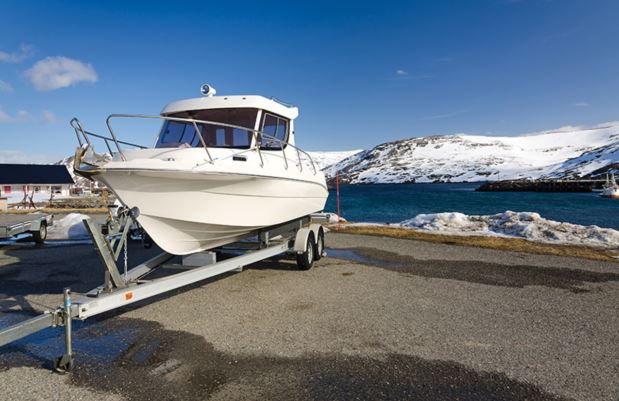
Don’t let the winter layoff spoil your first outing this year Avoid these 4 trailing problems and be ready for a great year on the lake!. By , Boating World Magazine.
BLACK TIRE MARKS
THE SCENE: The long, cold winter has finally ended and you’ve hitched up early on a perfect morning. As you start down the driveway, you hear a screeching noise, and the trailer doesn’t want to move. Two black tire marks mar your driveway.
WHAT HAPPENED? Your trailer tires didn’t turn.
WHY DID IT HAPPEN? Your trailer bearings are frozen.
WHAT CAN YOU DO? If you’re really lucky, like a friend of mine was, you can bang the outside of the bearing with a hammer and the bearings will free up. If you’re really, really lucky, you can drive slowly, very slowly, to a repair shop and get the bearings replaced. If not, you need someone to replace the bearings on the spot. Not cheap.
HOW CAN YOU PREVENT IT? When you’re putting your boat away for the winter is the time to
have the bearings checked and repacked by your dealer.
Trailer bearings come in a variety of styles, including waterproof, but if you believe they’re
permanently waterproof, well, I’ve got a nice bridge to sell you. Grease and synthetic seals
are what protect your bearings, and both should be renewed regularly.
LIGHTS OUT
THE SCENE: Lunch is packed and excited kids are walking around the boat when one says, “Hey, dad, the trailer lights aren’t on.”
WHAT HAPPENED? Lots of possibilities: a broken wire, a blown fuse in the car or burned out trailer lights.
WHY DID IT HAPPEN? The wiring system on trailers is, more than anything else, likely to go bad. Water, especially salt water, and electricity are not a happy combination.
WHAT CAN YOU DO? Start with the easy stuff: the car’s fuse box. If it’s OK, then take a look at the trailer wiring harness to see if it’s broken or abraded so it shorts on the trailer. If so, you may have enough slack to be able to join the broken wire with a twist connector until you can do a complete repair. Trailer lights rarely burn out all at once unless you had a lightning strike, but check the bulbs anyway by removing the plastic cover. If nothing solves the problem, get the trailer to a repair shop by driving slowly on back roads.
HOW CAN YOU PREVENT IT? Once a year, and preferably while the boat is off the trailer, you need to check the wiring. Look for brittle wires, corroded connectors and terminals, and bare wires worn by scuffing on driveways. Replace any of these problems with new marine-grade wiring of the proper size. If you find a number of problem areas, it’s a lot easier to just replace the entire wiring harness with a new one from a marine or RV store.
Once you’ve inspected the wiring, take some anti-corrosive spray (I like Corrosion Block) and work your way around, giving a shot to all connection terminals. Remove the light covers, pop out the light bulbs and give the sockets a dose of protection as well. When you remove the plastic light covers, check the rubber gasket. If it’s brittle or broken, replace it with a new one, either from a trailer store or cut to match from a piece of rubber gasket bought at an auto parts store. Don’t forget the clearance lights, either.
For items 3 and 4, go to the original article here.
Posted by Scott Freerksen “The Lake Guy”
